Strategic Planning for Hospitality: IHG Report, Module Analysis
VerifiedAdded on 2023/02/02
|12
|3919
|22
Report
AI Summary
This report provides a comprehensive strategic analysis of Intercontinental Hotels Group (IHG), examining its strategic options, implementation factors, and performance metrics. It delves into popular strategic choices like franchising, management contracts, joint ventures, and mergers and acquisitions, illustrating their application within IHG. The report critically analyzes factors affecting strategy implementation, including strategic leadership, structural design, information and control systems, and human resources management. Furthermore, it evaluates IHG's performance metrics, such as critical success factors, key performance indicators, and the balanced scorecard. The analysis highlights IHG's strategic decisions, the challenges faced, and the impact of these strategies on its market position and operational efficiency, offering a detailed overview of IHG's approach to strategic planning in the hospitality industry.
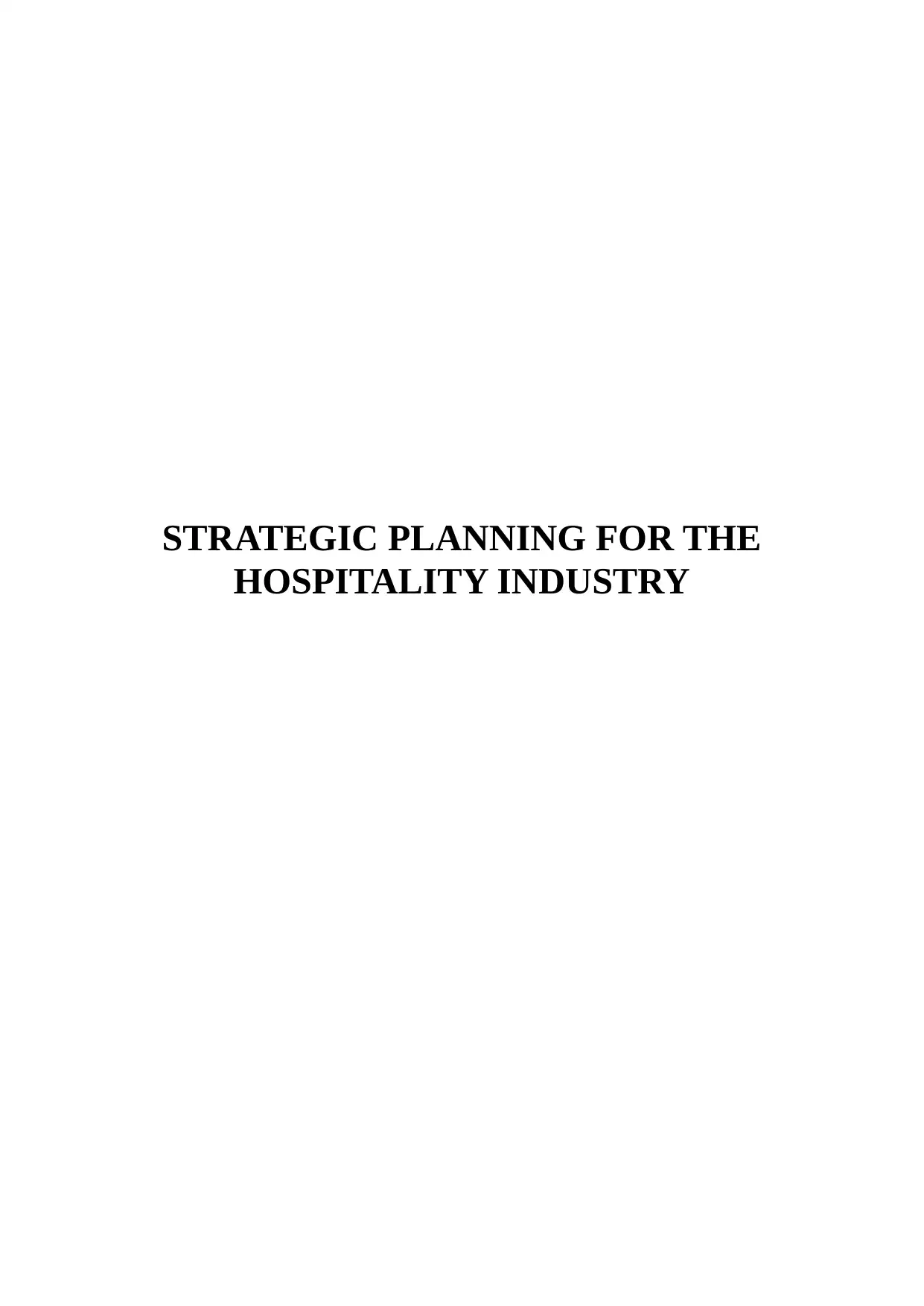
STRATEGIC PLANNING FOR THE
HOSPITALITY INDUSTRY
HOSPITALITY INDUSTRY
Paraphrase This Document
Need a fresh take? Get an instant paraphrase of this document with our AI Paraphraser

TABLE OF CONTENTS
INTRODUCTION ...............................................................................................................................3
MAIN BODY.......................................................................................................................................3
CONCLUSION....................................................................................................................................8
REFERENCES.....................................................................................................................................9
INTRODUCTION ...............................................................................................................................3
MAIN BODY.......................................................................................................................................3
CONCLUSION....................................................................................................................................8
REFERENCES.....................................................................................................................................9
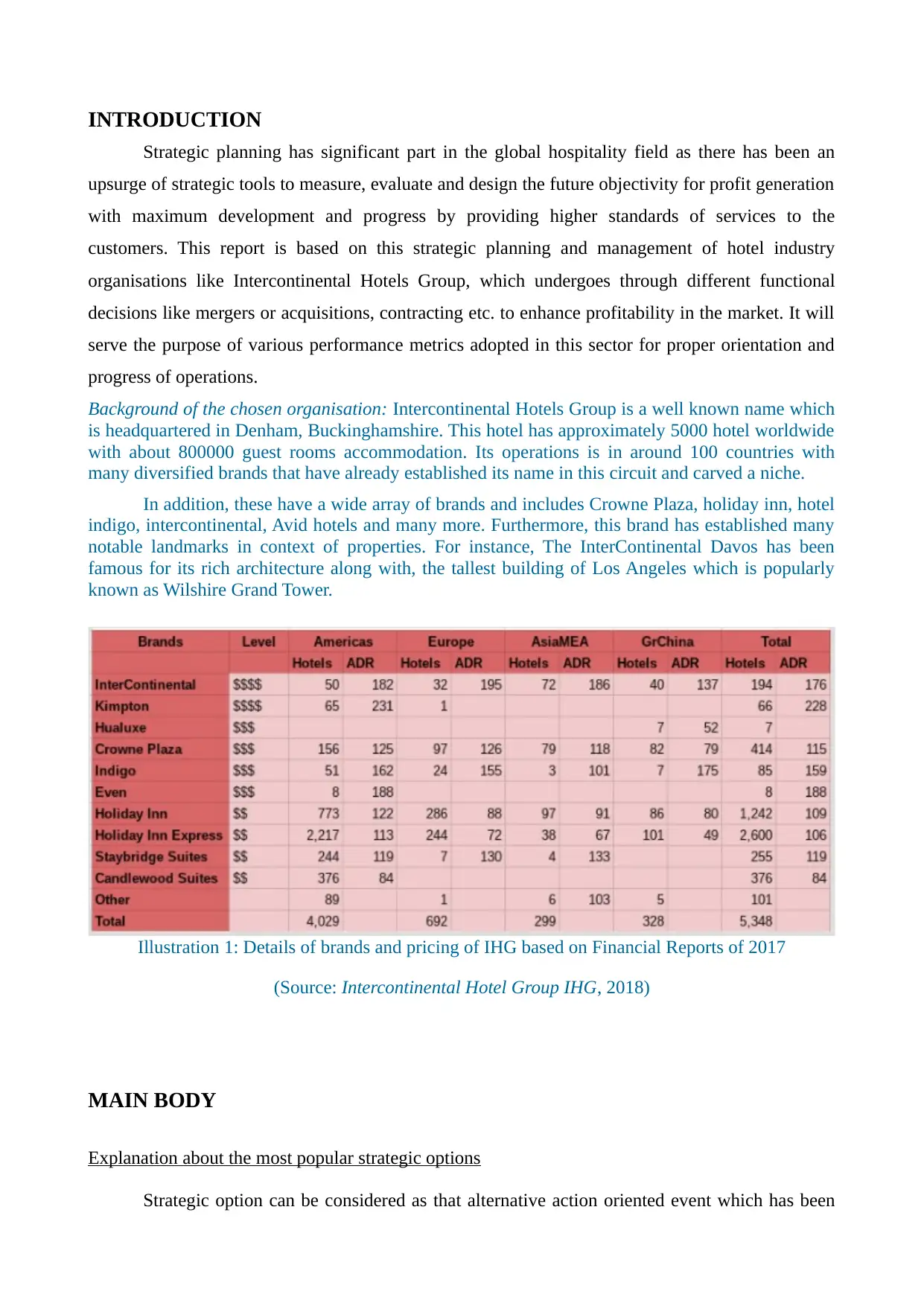
INTRODUCTION
Strategic planning has significant part in the global hospitality field as there has been an
upsurge of strategic tools to measure, evaluate and design the future objectivity for profit generation
with maximum development and progress by providing higher standards of services to the
customers. This report is based on this strategic planning and management of hotel industry
organisations like Intercontinental Hotels Group, which undergoes through different functional
decisions like mergers or acquisitions, contracting etc. to enhance profitability in the market. It will
serve the purpose of various performance metrics adopted in this sector for proper orientation and
progress of operations.
Background of the chosen organisation: Intercontinental Hotels Group is a well known name which
is headquartered in Denham, Buckinghamshire. This hotel has approximately 5000 hotel worldwide
with about 800000 guest rooms accommodation. Its operations is in around 100 countries with
many diversified brands that have already established its name in this circuit and carved a niche.
In addition, these have a wide array of brands and includes Crowne Plaza, holiday inn, hotel
indigo, intercontinental, Avid hotels and many more. Furthermore, this brand has established many
notable landmarks in context of properties. For instance, The InterContinental Davos has been
famous for its rich architecture along with, the tallest building of Los Angeles which is popularly
known as Wilshire Grand Tower.
MAIN BODY
Explanation about the most popular strategic options
Strategic option can be considered as that alternative action oriented event which has been
Illustration 1: Details of brands and pricing of IHG based on Financial Reports of 2017
(Source: Intercontinental Hotel Group IHG, 2018)
Strategic planning has significant part in the global hospitality field as there has been an
upsurge of strategic tools to measure, evaluate and design the future objectivity for profit generation
with maximum development and progress by providing higher standards of services to the
customers. This report is based on this strategic planning and management of hotel industry
organisations like Intercontinental Hotels Group, which undergoes through different functional
decisions like mergers or acquisitions, contracting etc. to enhance profitability in the market. It will
serve the purpose of various performance metrics adopted in this sector for proper orientation and
progress of operations.
Background of the chosen organisation: Intercontinental Hotels Group is a well known name which
is headquartered in Denham, Buckinghamshire. This hotel has approximately 5000 hotel worldwide
with about 800000 guest rooms accommodation. Its operations is in around 100 countries with
many diversified brands that have already established its name in this circuit and carved a niche.
In addition, these have a wide array of brands and includes Crowne Plaza, holiday inn, hotel
indigo, intercontinental, Avid hotels and many more. Furthermore, this brand has established many
notable landmarks in context of properties. For instance, The InterContinental Davos has been
famous for its rich architecture along with, the tallest building of Los Angeles which is popularly
known as Wilshire Grand Tower.
MAIN BODY
Explanation about the most popular strategic options
Strategic option can be considered as that alternative action oriented event which has been
Illustration 1: Details of brands and pricing of IHG based on Financial Reports of 2017
(Source: Intercontinental Hotel Group IHG, 2018)
⊘ This is a preview!⊘
Do you want full access?
Subscribe today to unlock all pages.

Trusted by 1+ million students worldwide
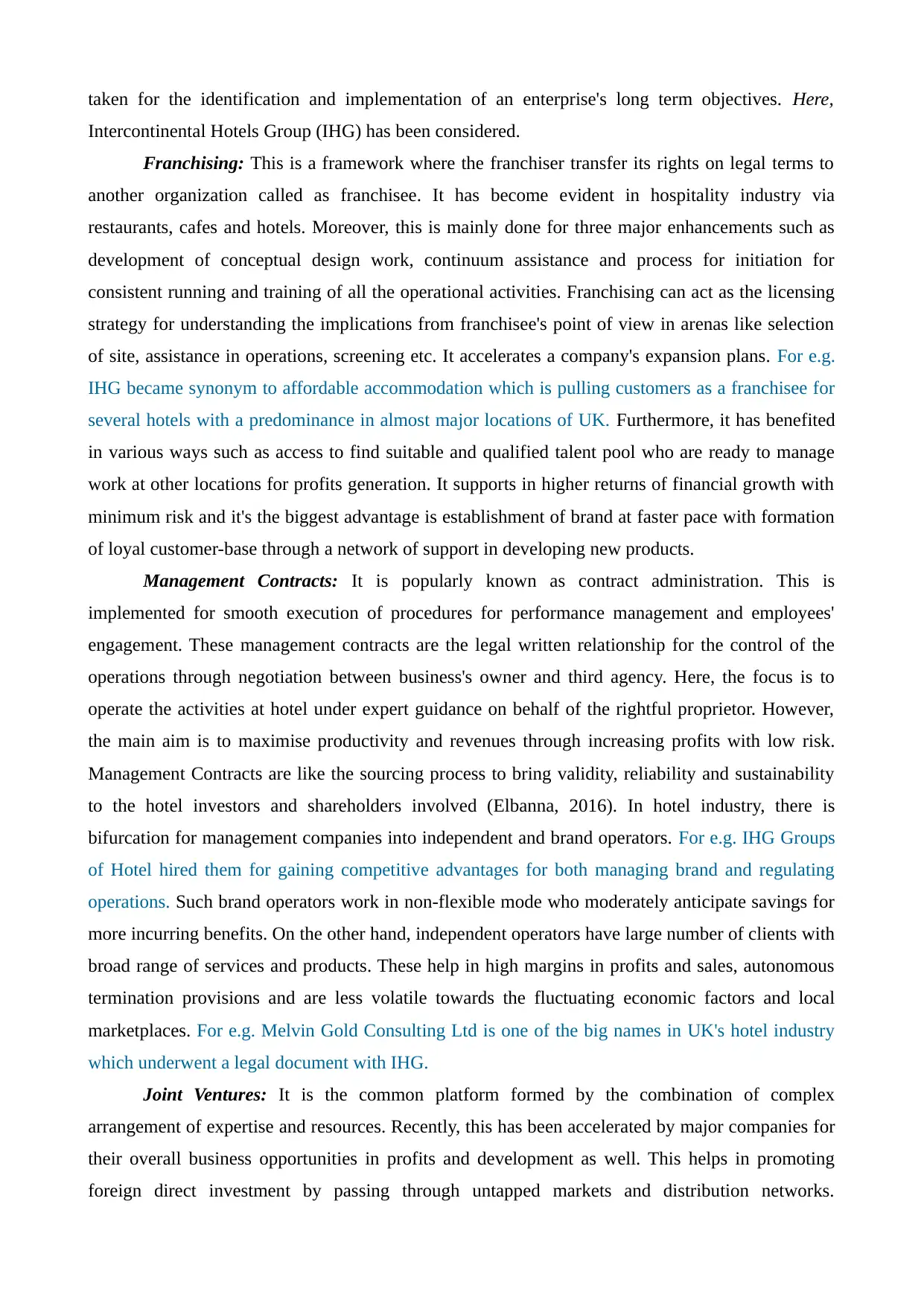
taken for the identification and implementation of an enterprise's long term objectives. Here,
Intercontinental Hotels Group (IHG) has been considered.
Franchising: This is a framework where the franchiser transfer its rights on legal terms to
another organization called as franchisee. It has become evident in hospitality industry via
restaurants, cafes and hotels. Moreover, this is mainly done for three major enhancements such as
development of conceptual design work, continuum assistance and process for initiation for
consistent running and training of all the operational activities. Franchising can act as the licensing
strategy for understanding the implications from franchisee's point of view in arenas like selection
of site, assistance in operations, screening etc. It accelerates a company's expansion plans. For e.g.
IHG became synonym to affordable accommodation which is pulling customers as a franchisee for
several hotels with a predominance in almost major locations of UK. Furthermore, it has benefited
in various ways such as access to find suitable and qualified talent pool who are ready to manage
work at other locations for profits generation. It supports in higher returns of financial growth with
minimum risk and it's the biggest advantage is establishment of brand at faster pace with formation
of loyal customer-base through a network of support in developing new products.
Management Contracts: It is popularly known as contract administration. This is
implemented for smooth execution of procedures for performance management and employees'
engagement. These management contracts are the legal written relationship for the control of the
operations through negotiation between business's owner and third agency. Here, the focus is to
operate the activities at hotel under expert guidance on behalf of the rightful proprietor. However,
the main aim is to maximise productivity and revenues through increasing profits with low risk.
Management Contracts are like the sourcing process to bring validity, reliability and sustainability
to the hotel investors and shareholders involved (Elbanna, 2016). In hotel industry, there is
bifurcation for management companies into independent and brand operators. For e.g. IHG Groups
of Hotel hired them for gaining competitive advantages for both managing brand and regulating
operations. Such brand operators work in non-flexible mode who moderately anticipate savings for
more incurring benefits. On the other hand, independent operators have large number of clients with
broad range of services and products. These help in high margins in profits and sales, autonomous
termination provisions and are less volatile towards the fluctuating economic factors and local
marketplaces. For e.g. Melvin Gold Consulting Ltd is one of the big names in UK's hotel industry
which underwent a legal document with IHG.
Joint Ventures: It is the common platform formed by the combination of complex
arrangement of expertise and resources. Recently, this has been accelerated by major companies for
their overall business opportunities in profits and development as well. This helps in promoting
foreign direct investment by passing through untapped markets and distribution networks.
Intercontinental Hotels Group (IHG) has been considered.
Franchising: This is a framework where the franchiser transfer its rights on legal terms to
another organization called as franchisee. It has become evident in hospitality industry via
restaurants, cafes and hotels. Moreover, this is mainly done for three major enhancements such as
development of conceptual design work, continuum assistance and process for initiation for
consistent running and training of all the operational activities. Franchising can act as the licensing
strategy for understanding the implications from franchisee's point of view in arenas like selection
of site, assistance in operations, screening etc. It accelerates a company's expansion plans. For e.g.
IHG became synonym to affordable accommodation which is pulling customers as a franchisee for
several hotels with a predominance in almost major locations of UK. Furthermore, it has benefited
in various ways such as access to find suitable and qualified talent pool who are ready to manage
work at other locations for profits generation. It supports in higher returns of financial growth with
minimum risk and it's the biggest advantage is establishment of brand at faster pace with formation
of loyal customer-base through a network of support in developing new products.
Management Contracts: It is popularly known as contract administration. This is
implemented for smooth execution of procedures for performance management and employees'
engagement. These management contracts are the legal written relationship for the control of the
operations through negotiation between business's owner and third agency. Here, the focus is to
operate the activities at hotel under expert guidance on behalf of the rightful proprietor. However,
the main aim is to maximise productivity and revenues through increasing profits with low risk.
Management Contracts are like the sourcing process to bring validity, reliability and sustainability
to the hotel investors and shareholders involved (Elbanna, 2016). In hotel industry, there is
bifurcation for management companies into independent and brand operators. For e.g. IHG Groups
of Hotel hired them for gaining competitive advantages for both managing brand and regulating
operations. Such brand operators work in non-flexible mode who moderately anticipate savings for
more incurring benefits. On the other hand, independent operators have large number of clients with
broad range of services and products. These help in high margins in profits and sales, autonomous
termination provisions and are less volatile towards the fluctuating economic factors and local
marketplaces. For e.g. Melvin Gold Consulting Ltd is one of the big names in UK's hotel industry
which underwent a legal document with IHG.
Joint Ventures: It is the common platform formed by the combination of complex
arrangement of expertise and resources. Recently, this has been accelerated by major companies for
their overall business opportunities in profits and development as well. This helps in promoting
foreign direct investment by passing through untapped markets and distribution networks.
Paraphrase This Document
Need a fresh take? Get an instant paraphrase of this document with our AI Paraphraser
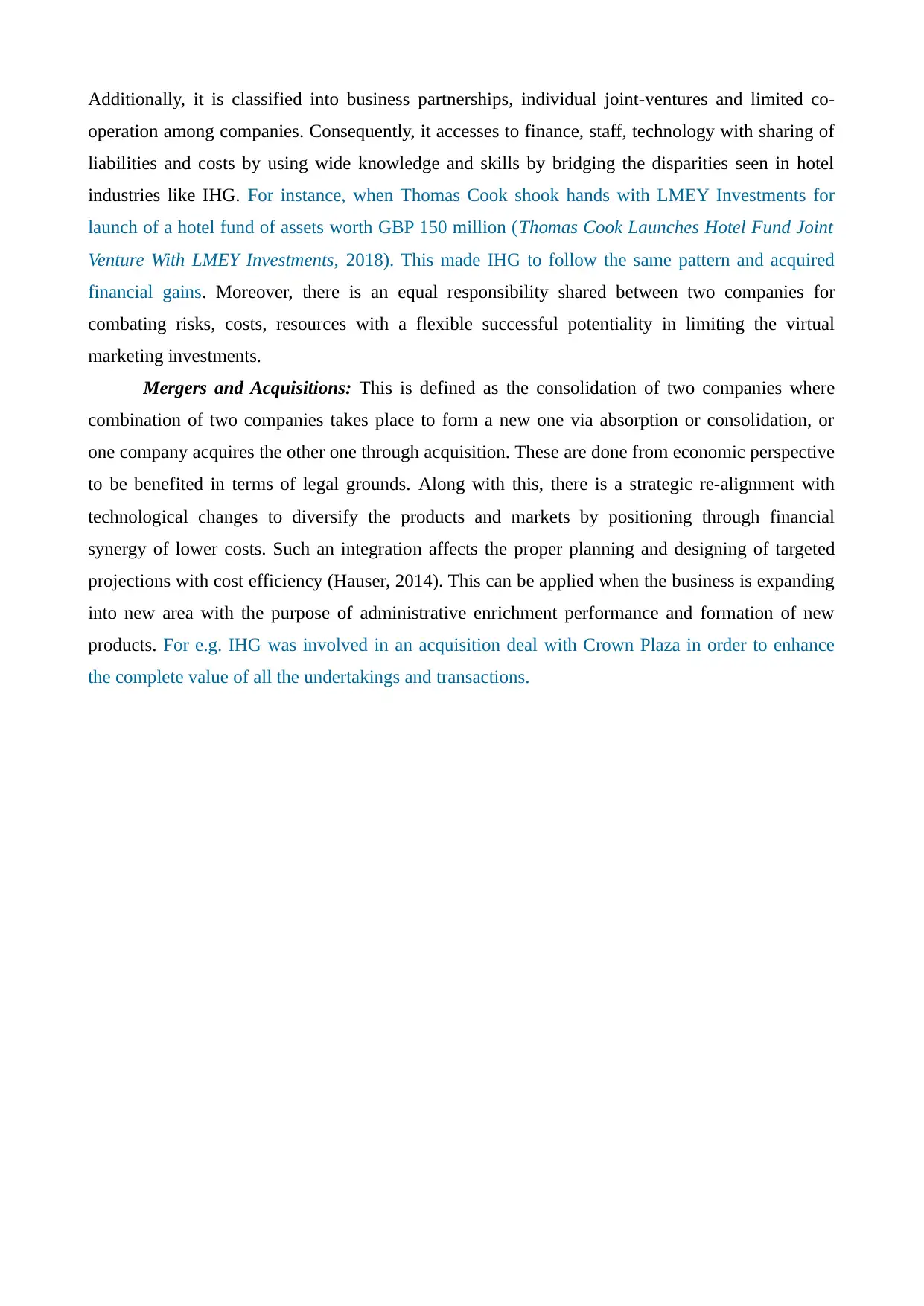
Additionally, it is classified into business partnerships, individual joint-ventures and limited co-
operation among companies. Consequently, it accesses to finance, staff, technology with sharing of
liabilities and costs by using wide knowledge and skills by bridging the disparities seen in hotel
industries like IHG. For instance, when Thomas Cook shook hands with LMEY Investments for
launch of a hotel fund of assets worth GBP 150 million (Thomas Cook Launches Hotel Fund Joint
Venture With LMEY Investments, 2018). This made IHG to follow the same pattern and acquired
financial gains. Moreover, there is an equal responsibility shared between two companies for
combating risks, costs, resources with a flexible successful potentiality in limiting the virtual
marketing investments.
Mergers and Acquisitions: This is defined as the consolidation of two companies where
combination of two companies takes place to form a new one via absorption or consolidation, or
one company acquires the other one through acquisition. These are done from economic perspective
to be benefited in terms of legal grounds. Along with this, there is a strategic re-alignment with
technological changes to diversify the products and markets by positioning through financial
synergy of lower costs. Such an integration affects the proper planning and designing of targeted
projections with cost efficiency (Hauser, 2014). This can be applied when the business is expanding
into new area with the purpose of administrative enrichment performance and formation of new
products. For e.g. IHG was involved in an acquisition deal with Crown Plaza in order to enhance
the complete value of all the undertakings and transactions.
operation among companies. Consequently, it accesses to finance, staff, technology with sharing of
liabilities and costs by using wide knowledge and skills by bridging the disparities seen in hotel
industries like IHG. For instance, when Thomas Cook shook hands with LMEY Investments for
launch of a hotel fund of assets worth GBP 150 million (Thomas Cook Launches Hotel Fund Joint
Venture With LMEY Investments, 2018). This made IHG to follow the same pattern and acquired
financial gains. Moreover, there is an equal responsibility shared between two companies for
combating risks, costs, resources with a flexible successful potentiality in limiting the virtual
marketing investments.
Mergers and Acquisitions: This is defined as the consolidation of two companies where
combination of two companies takes place to form a new one via absorption or consolidation, or
one company acquires the other one through acquisition. These are done from economic perspective
to be benefited in terms of legal grounds. Along with this, there is a strategic re-alignment with
technological changes to diversify the products and markets by positioning through financial
synergy of lower costs. Such an integration affects the proper planning and designing of targeted
projections with cost efficiency (Hauser, 2014). This can be applied when the business is expanding
into new area with the purpose of administrative enrichment performance and formation of new
products. For e.g. IHG was involved in an acquisition deal with Crown Plaza in order to enhance
the complete value of all the undertakings and transactions.
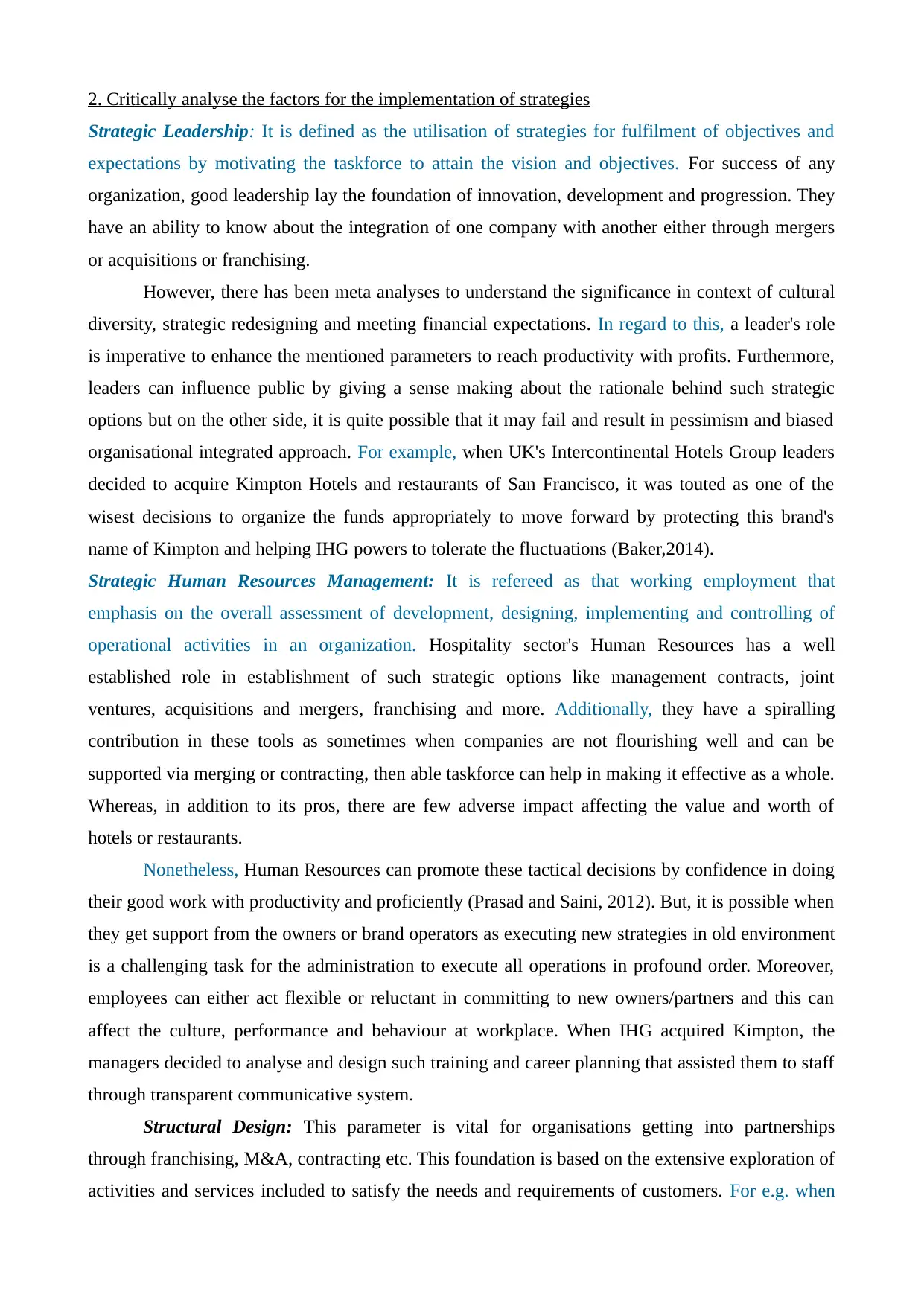
2. Critically analyse the factors for the implementation of strategies
Strategic Leadership: It is defined as the utilisation of strategies for fulfilment of objectives and
expectations by motivating the taskforce to attain the vision and objectives. For success of any
organization, good leadership lay the foundation of innovation, development and progression. They
have an ability to know about the integration of one company with another either through mergers
or acquisitions or franchising.
However, there has been meta analyses to understand the significance in context of cultural
diversity, strategic redesigning and meeting financial expectations. In regard to this, a leader's role
is imperative to enhance the mentioned parameters to reach productivity with profits. Furthermore,
leaders can influence public by giving a sense making about the rationale behind such strategic
options but on the other side, it is quite possible that it may fail and result in pessimism and biased
organisational integrated approach. For example, when UK's Intercontinental Hotels Group leaders
decided to acquire Kimpton Hotels and restaurants of San Francisco, it was touted as one of the
wisest decisions to organize the funds appropriately to move forward by protecting this brand's
name of Kimpton and helping IHG powers to tolerate the fluctuations (Baker,2014).
Strategic Human Resources Management: It is refereed as that working employment that
emphasis on the overall assessment of development, designing, implementing and controlling of
operational activities in an organization. Hospitality sector's Human Resources has a well
established role in establishment of such strategic options like management contracts, joint
ventures, acquisitions and mergers, franchising and more. Additionally, they have a spiralling
contribution in these tools as sometimes when companies are not flourishing well and can be
supported via merging or contracting, then able taskforce can help in making it effective as a whole.
Whereas, in addition to its pros, there are few adverse impact affecting the value and worth of
hotels or restaurants.
Nonetheless, Human Resources can promote these tactical decisions by confidence in doing
their good work with productivity and proficiently (Prasad and Saini, 2012). But, it is possible when
they get support from the owners or brand operators as executing new strategies in old environment
is a challenging task for the administration to execute all operations in profound order. Moreover,
employees can either act flexible or reluctant in committing to new owners/partners and this can
affect the culture, performance and behaviour at workplace. When IHG acquired Kimpton, the
managers decided to analyse and design such training and career planning that assisted them to staff
through transparent communicative system.
Structural Design: This parameter is vital for organisations getting into partnerships
through franchising, M&A, contracting etc. This foundation is based on the extensive exploration of
activities and services included to satisfy the needs and requirements of customers. For e.g. when
Strategic Leadership: It is defined as the utilisation of strategies for fulfilment of objectives and
expectations by motivating the taskforce to attain the vision and objectives. For success of any
organization, good leadership lay the foundation of innovation, development and progression. They
have an ability to know about the integration of one company with another either through mergers
or acquisitions or franchising.
However, there has been meta analyses to understand the significance in context of cultural
diversity, strategic redesigning and meeting financial expectations. In regard to this, a leader's role
is imperative to enhance the mentioned parameters to reach productivity with profits. Furthermore,
leaders can influence public by giving a sense making about the rationale behind such strategic
options but on the other side, it is quite possible that it may fail and result in pessimism and biased
organisational integrated approach. For example, when UK's Intercontinental Hotels Group leaders
decided to acquire Kimpton Hotels and restaurants of San Francisco, it was touted as one of the
wisest decisions to organize the funds appropriately to move forward by protecting this brand's
name of Kimpton and helping IHG powers to tolerate the fluctuations (Baker,2014).
Strategic Human Resources Management: It is refereed as that working employment that
emphasis on the overall assessment of development, designing, implementing and controlling of
operational activities in an organization. Hospitality sector's Human Resources has a well
established role in establishment of such strategic options like management contracts, joint
ventures, acquisitions and mergers, franchising and more. Additionally, they have a spiralling
contribution in these tools as sometimes when companies are not flourishing well and can be
supported via merging or contracting, then able taskforce can help in making it effective as a whole.
Whereas, in addition to its pros, there are few adverse impact affecting the value and worth of
hotels or restaurants.
Nonetheless, Human Resources can promote these tactical decisions by confidence in doing
their good work with productivity and proficiently (Prasad and Saini, 2012). But, it is possible when
they get support from the owners or brand operators as executing new strategies in old environment
is a challenging task for the administration to execute all operations in profound order. Moreover,
employees can either act flexible or reluctant in committing to new owners/partners and this can
affect the culture, performance and behaviour at workplace. When IHG acquired Kimpton, the
managers decided to analyse and design such training and career planning that assisted them to staff
through transparent communicative system.
Structural Design: This parameter is vital for organisations getting into partnerships
through franchising, M&A, contracting etc. This foundation is based on the extensive exploration of
activities and services included to satisfy the needs and requirements of customers. For e.g. when
⊘ This is a preview!⊘
Do you want full access?
Subscribe today to unlock all pages.

Trusted by 1+ million students worldwide
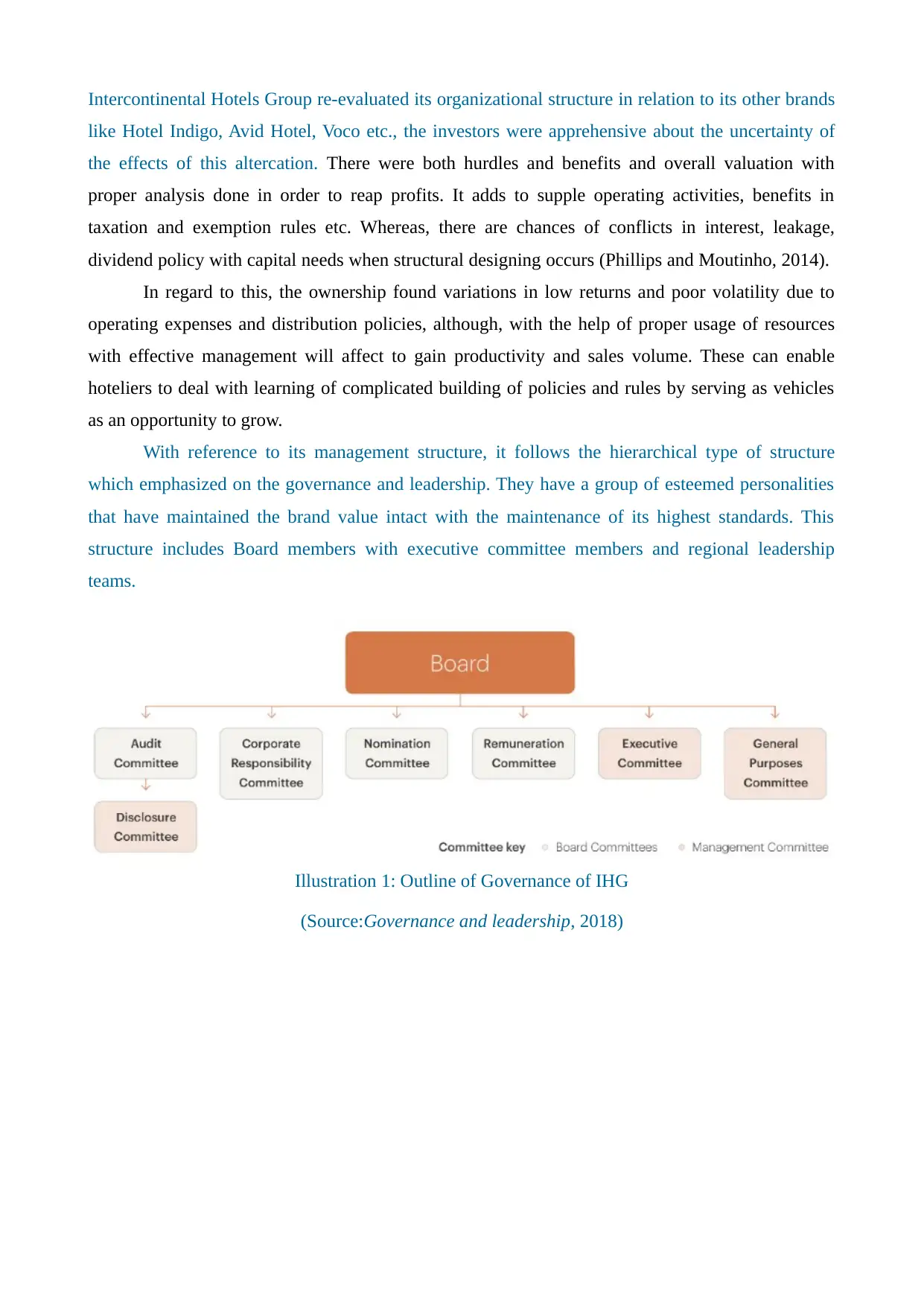
Intercontinental Hotels Group re-evaluated its organizational structure in relation to its other brands
like Hotel Indigo, Avid Hotel, Voco etc., the investors were apprehensive about the uncertainty of
the effects of this altercation. There were both hurdles and benefits and overall valuation with
proper analysis done in order to reap profits. It adds to supple operating activities, benefits in
taxation and exemption rules etc. Whereas, there are chances of conflicts in interest, leakage,
dividend policy with capital needs when structural designing occurs (Phillips and Moutinho, 2014).
In regard to this, the ownership found variations in low returns and poor volatility due to
operating expenses and distribution policies, although, with the help of proper usage of resources
with effective management will affect to gain productivity and sales volume. These can enable
hoteliers to deal with learning of complicated building of policies and rules by serving as vehicles
as an opportunity to grow.
With reference to its management structure, it follows the hierarchical type of structure
which emphasized on the governance and leadership. They have a group of esteemed personalities
that have maintained the brand value intact with the maintenance of its highest standards. This
structure includes Board members with executive committee members and regional leadership
teams.
Illustration 1: Outline of Governance of IHG
(Source:Governance and leadership, 2018)
like Hotel Indigo, Avid Hotel, Voco etc., the investors were apprehensive about the uncertainty of
the effects of this altercation. There were both hurdles and benefits and overall valuation with
proper analysis done in order to reap profits. It adds to supple operating activities, benefits in
taxation and exemption rules etc. Whereas, there are chances of conflicts in interest, leakage,
dividend policy with capital needs when structural designing occurs (Phillips and Moutinho, 2014).
In regard to this, the ownership found variations in low returns and poor volatility due to
operating expenses and distribution policies, although, with the help of proper usage of resources
with effective management will affect to gain productivity and sales volume. These can enable
hoteliers to deal with learning of complicated building of policies and rules by serving as vehicles
as an opportunity to grow.
With reference to its management structure, it follows the hierarchical type of structure
which emphasized on the governance and leadership. They have a group of esteemed personalities
that have maintained the brand value intact with the maintenance of its highest standards. This
structure includes Board members with executive committee members and regional leadership
teams.
Illustration 1: Outline of Governance of IHG
(Source:Governance and leadership, 2018)
Paraphrase This Document
Need a fresh take? Get an instant paraphrase of this document with our AI Paraphraser
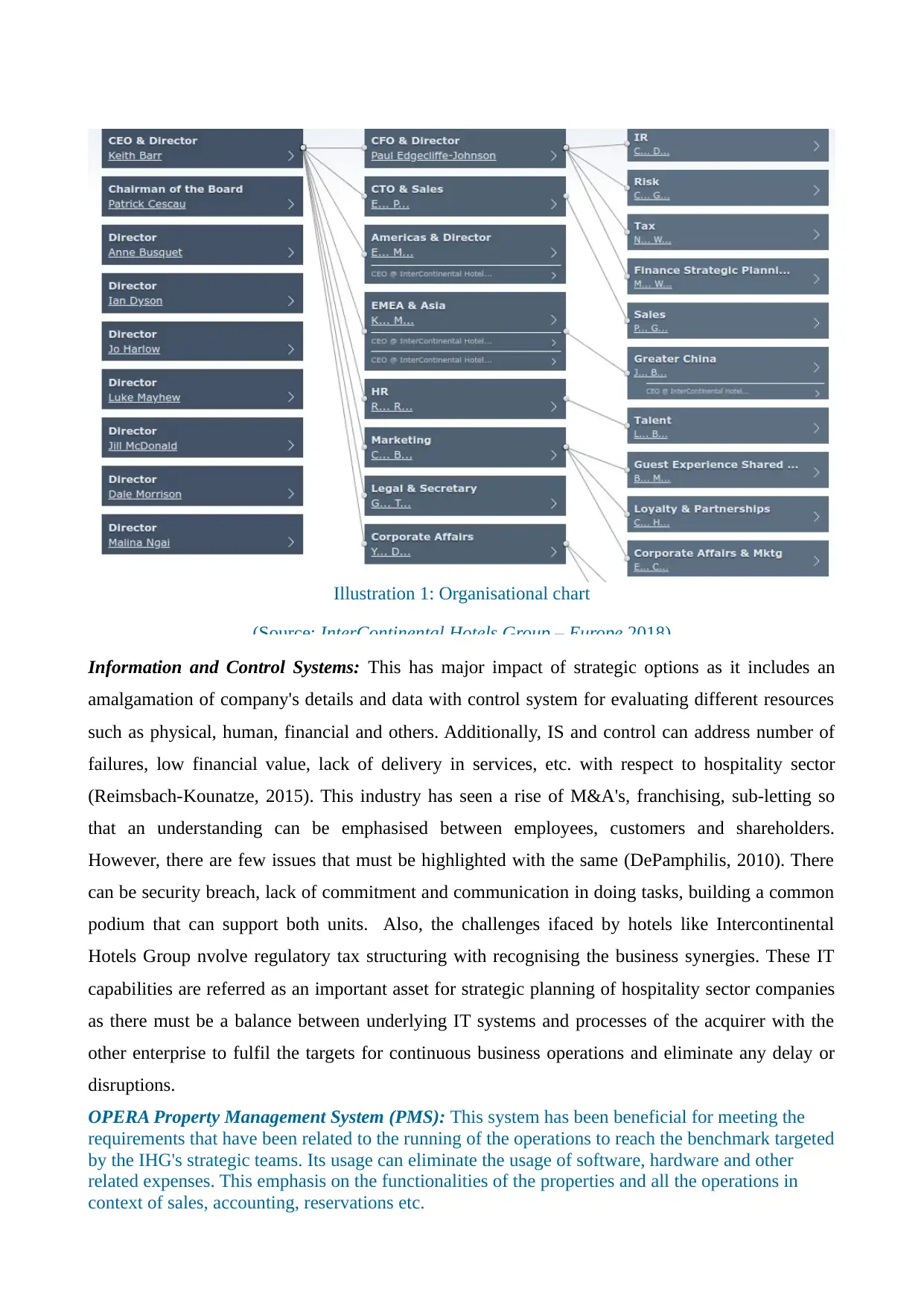
Information and Control Systems: This has major impact of strategic options as it includes an
amalgamation of company's details and data with control system for evaluating different resources
such as physical, human, financial and others. Additionally, IS and control can address number of
failures, low financial value, lack of delivery in services, etc. with respect to hospitality sector
(Reimsbach-Kounatze, 2015). This industry has seen a rise of M&A's, franchising, sub-letting so
that an understanding can be emphasised between employees, customers and shareholders.
However, there are few issues that must be highlighted with the same (DePamphilis, 2010). There
can be security breach, lack of commitment and communication in doing tasks, building a common
podium that can support both units. Also, the challenges ifaced by hotels like Intercontinental
Hotels Group nvolve regulatory tax structuring with recognising the business synergies. These IT
capabilities are referred as an important asset for strategic planning of hospitality sector companies
as there must be a balance between underlying IT systems and processes of the acquirer with the
other enterprise to fulfil the targets for continuous business operations and eliminate any delay or
disruptions.
OPERA Property Management System (PMS): This system has been beneficial for meeting the
requirements that have been related to the running of the operations to reach the benchmark targeted
by the IHG's strategic teams. Its usage can eliminate the usage of software, hardware and other
related expenses. This emphasis on the functionalities of the properties and all the operations in
context of sales, accounting, reservations etc.
Illustration 1: Organisational chart
(Source: InterContinental Hotels Group – Europe,2018)
amalgamation of company's details and data with control system for evaluating different resources
such as physical, human, financial and others. Additionally, IS and control can address number of
failures, low financial value, lack of delivery in services, etc. with respect to hospitality sector
(Reimsbach-Kounatze, 2015). This industry has seen a rise of M&A's, franchising, sub-letting so
that an understanding can be emphasised between employees, customers and shareholders.
However, there are few issues that must be highlighted with the same (DePamphilis, 2010). There
can be security breach, lack of commitment and communication in doing tasks, building a common
podium that can support both units. Also, the challenges ifaced by hotels like Intercontinental
Hotels Group nvolve regulatory tax structuring with recognising the business synergies. These IT
capabilities are referred as an important asset for strategic planning of hospitality sector companies
as there must be a balance between underlying IT systems and processes of the acquirer with the
other enterprise to fulfil the targets for continuous business operations and eliminate any delay or
disruptions.
OPERA Property Management System (PMS): This system has been beneficial for meeting the
requirements that have been related to the running of the operations to reach the benchmark targeted
by the IHG's strategic teams. Its usage can eliminate the usage of software, hardware and other
related expenses. This emphasis on the functionalities of the properties and all the operations in
context of sales, accounting, reservations etc.
Illustration 1: Organisational chart
(Source: InterContinental Hotels Group – Europe,2018)
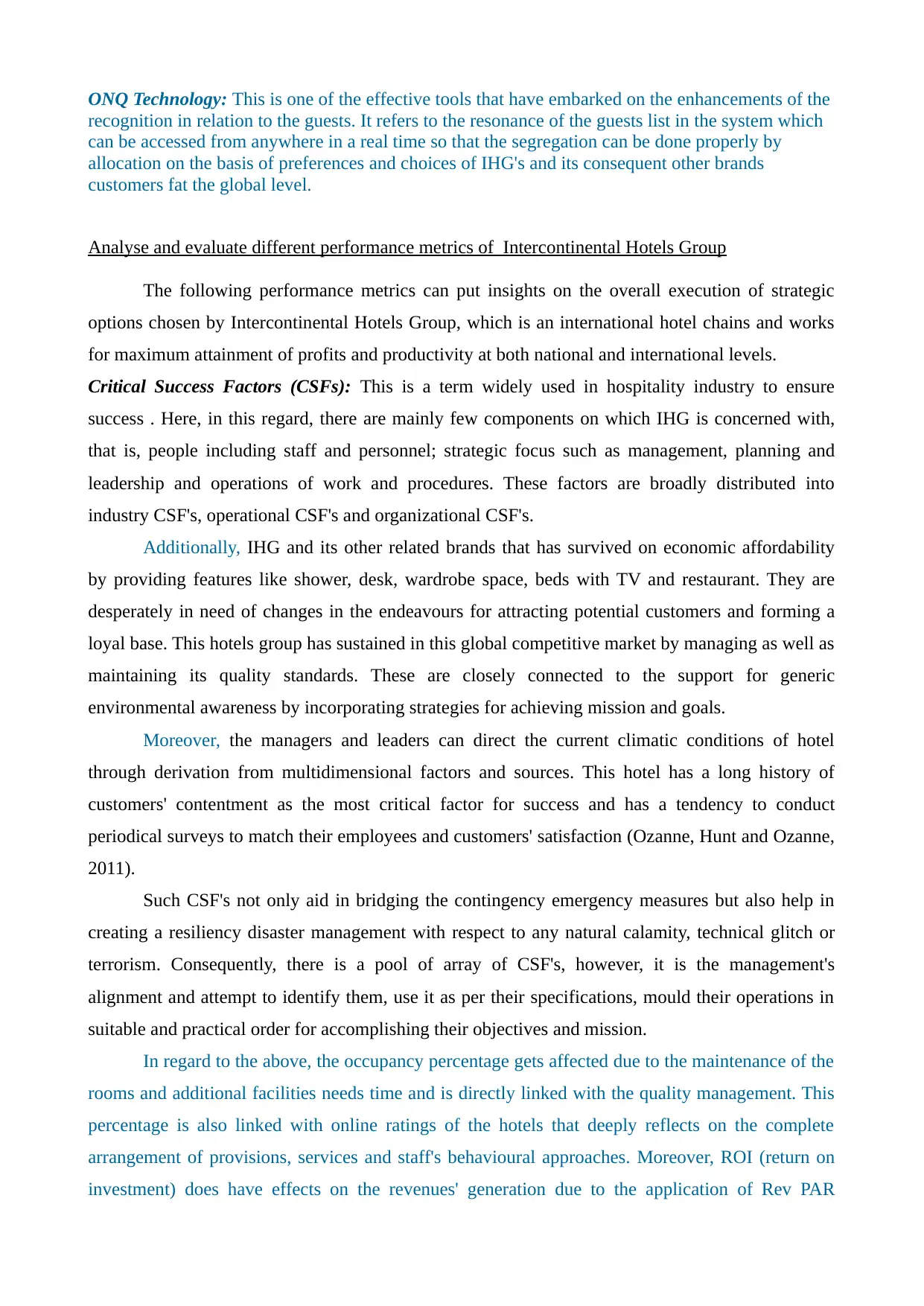
ONQ Technology: This is one of the effective tools that have embarked on the enhancements of the
recognition in relation to the guests. It refers to the resonance of the guests list in the system which
can be accessed from anywhere in a real time so that the segregation can be done properly by
allocation on the basis of preferences and choices of IHG's and its consequent other brands
customers fat the global level.
Analyse and evaluate different performance metrics of Intercontinental Hotels Group
The following performance metrics can put insights on the overall execution of strategic
options chosen by Intercontinental Hotels Group, which is an international hotel chains and works
for maximum attainment of profits and productivity at both national and international levels.
Critical Success Factors (CSFs): This is a term widely used in hospitality industry to ensure
success . Here, in this regard, there are mainly few components on which IHG is concerned with,
that is, people including staff and personnel; strategic focus such as management, planning and
leadership and operations of work and procedures. These factors are broadly distributed into
industry CSF's, operational CSF's and organizational CSF's.
Additionally, IHG and its other related brands that has survived on economic affordability
by providing features like shower, desk, wardrobe space, beds with TV and restaurant. They are
desperately in need of changes in the endeavours for attracting potential customers and forming a
loyal base. This hotels group has sustained in this global competitive market by managing as well as
maintaining its quality standards. These are closely connected to the support for generic
environmental awareness by incorporating strategies for achieving mission and goals.
Moreover, the managers and leaders can direct the current climatic conditions of hotel
through derivation from multidimensional factors and sources. This hotel has a long history of
customers' contentment as the most critical factor for success and has a tendency to conduct
periodical surveys to match their employees and customers' satisfaction (Ozanne, Hunt and Ozanne,
2011).
Such CSF's not only aid in bridging the contingency emergency measures but also help in
creating a resiliency disaster management with respect to any natural calamity, technical glitch or
terrorism. Consequently, there is a pool of array of CSF's, however, it is the management's
alignment and attempt to identify them, use it as per their specifications, mould their operations in
suitable and practical order for accomplishing their objectives and mission.
In regard to the above, the occupancy percentage gets affected due to the maintenance of the
rooms and additional facilities needs time and is directly linked with the quality management. This
percentage is also linked with online ratings of the hotels that deeply reflects on the complete
arrangement of provisions, services and staff's behavioural approaches. Moreover, ROI (return on
investment) does have effects on the revenues' generation due to the application of Rev PAR
recognition in relation to the guests. It refers to the resonance of the guests list in the system which
can be accessed from anywhere in a real time so that the segregation can be done properly by
allocation on the basis of preferences and choices of IHG's and its consequent other brands
customers fat the global level.
Analyse and evaluate different performance metrics of Intercontinental Hotels Group
The following performance metrics can put insights on the overall execution of strategic
options chosen by Intercontinental Hotels Group, which is an international hotel chains and works
for maximum attainment of profits and productivity at both national and international levels.
Critical Success Factors (CSFs): This is a term widely used in hospitality industry to ensure
success . Here, in this regard, there are mainly few components on which IHG is concerned with,
that is, people including staff and personnel; strategic focus such as management, planning and
leadership and operations of work and procedures. These factors are broadly distributed into
industry CSF's, operational CSF's and organizational CSF's.
Additionally, IHG and its other related brands that has survived on economic affordability
by providing features like shower, desk, wardrobe space, beds with TV and restaurant. They are
desperately in need of changes in the endeavours for attracting potential customers and forming a
loyal base. This hotels group has sustained in this global competitive market by managing as well as
maintaining its quality standards. These are closely connected to the support for generic
environmental awareness by incorporating strategies for achieving mission and goals.
Moreover, the managers and leaders can direct the current climatic conditions of hotel
through derivation from multidimensional factors and sources. This hotel has a long history of
customers' contentment as the most critical factor for success and has a tendency to conduct
periodical surveys to match their employees and customers' satisfaction (Ozanne, Hunt and Ozanne,
2011).
Such CSF's not only aid in bridging the contingency emergency measures but also help in
creating a resiliency disaster management with respect to any natural calamity, technical glitch or
terrorism. Consequently, there is a pool of array of CSF's, however, it is the management's
alignment and attempt to identify them, use it as per their specifications, mould their operations in
suitable and practical order for accomplishing their objectives and mission.
In regard to the above, the occupancy percentage gets affected due to the maintenance of the
rooms and additional facilities needs time and is directly linked with the quality management. This
percentage is also linked with online ratings of the hotels that deeply reflects on the complete
arrangement of provisions, services and staff's behavioural approaches. Moreover, ROI (return on
investment) does have effects on the revenues' generation due to the application of Rev PAR
⊘ This is a preview!⊘
Do you want full access?
Subscribe today to unlock all pages.

Trusted by 1+ million students worldwide
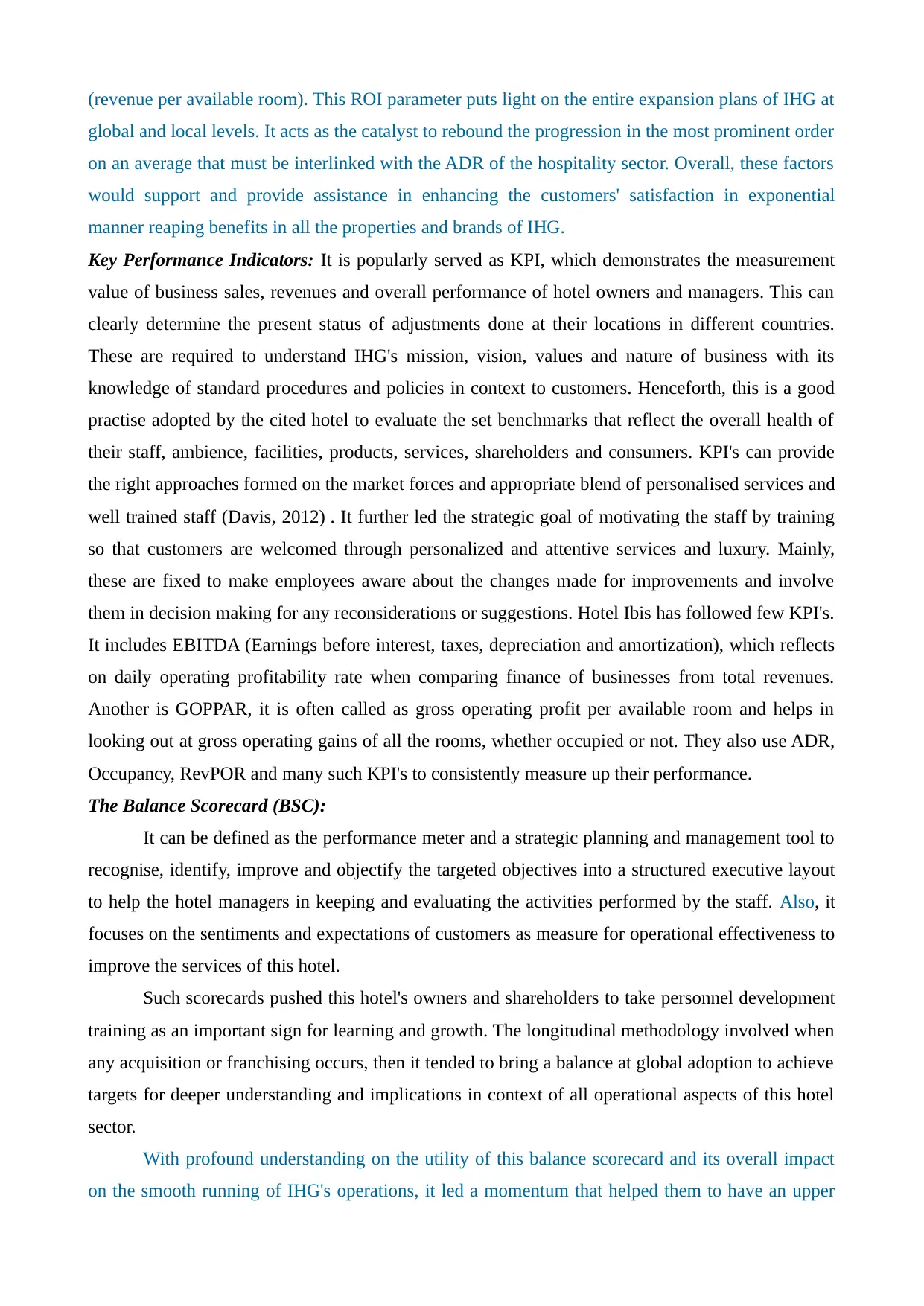
(revenue per available room). This ROI parameter puts light on the entire expansion plans of IHG at
global and local levels. It acts as the catalyst to rebound the progression in the most prominent order
on an average that must be interlinked with the ADR of the hospitality sector. Overall, these factors
would support and provide assistance in enhancing the customers' satisfaction in exponential
manner reaping benefits in all the properties and brands of IHG.
Key Performance Indicators: It is popularly served as KPI, which demonstrates the measurement
value of business sales, revenues and overall performance of hotel owners and managers. This can
clearly determine the present status of adjustments done at their locations in different countries.
These are required to understand IHG's mission, vision, values and nature of business with its
knowledge of standard procedures and policies in context to customers. Henceforth, this is a good
practise adopted by the cited hotel to evaluate the set benchmarks that reflect the overall health of
their staff, ambience, facilities, products, services, shareholders and consumers. KPI's can provide
the right approaches formed on the market forces and appropriate blend of personalised services and
well trained staff (Davis, 2012) . It further led the strategic goal of motivating the staff by training
so that customers are welcomed through personalized and attentive services and luxury. Mainly,
these are fixed to make employees aware about the changes made for improvements and involve
them in decision making for any reconsiderations or suggestions. Hotel Ibis has followed few KPI's.
It includes EBITDA (Earnings before interest, taxes, depreciation and amortization), which reflects
on daily operating profitability rate when comparing finance of businesses from total revenues.
Another is GOPPAR, it is often called as gross operating profit per available room and helps in
looking out at gross operating gains of all the rooms, whether occupied or not. They also use ADR,
Occupancy, RevPOR and many such KPI's to consistently measure up their performance.
The Balance Scorecard (BSC):
It can be defined as the performance meter and a strategic planning and management tool to
recognise, identify, improve and objectify the targeted objectives into a structured executive layout
to help the hotel managers in keeping and evaluating the activities performed by the staff. Also, it
focuses on the sentiments and expectations of customers as measure for operational effectiveness to
improve the services of this hotel.
Such scorecards pushed this hotel's owners and shareholders to take personnel development
training as an important sign for learning and growth. The longitudinal methodology involved when
any acquisition or franchising occurs, then it tended to bring a balance at global adoption to achieve
targets for deeper understanding and implications in context of all operational aspects of this hotel
sector.
With profound understanding on the utility of this balance scorecard and its overall impact
on the smooth running of IHG's operations, it led a momentum that helped them to have an upper
global and local levels. It acts as the catalyst to rebound the progression in the most prominent order
on an average that must be interlinked with the ADR of the hospitality sector. Overall, these factors
would support and provide assistance in enhancing the customers' satisfaction in exponential
manner reaping benefits in all the properties and brands of IHG.
Key Performance Indicators: It is popularly served as KPI, which demonstrates the measurement
value of business sales, revenues and overall performance of hotel owners and managers. This can
clearly determine the present status of adjustments done at their locations in different countries.
These are required to understand IHG's mission, vision, values and nature of business with its
knowledge of standard procedures and policies in context to customers. Henceforth, this is a good
practise adopted by the cited hotel to evaluate the set benchmarks that reflect the overall health of
their staff, ambience, facilities, products, services, shareholders and consumers. KPI's can provide
the right approaches formed on the market forces and appropriate blend of personalised services and
well trained staff (Davis, 2012) . It further led the strategic goal of motivating the staff by training
so that customers are welcomed through personalized and attentive services and luxury. Mainly,
these are fixed to make employees aware about the changes made for improvements and involve
them in decision making for any reconsiderations or suggestions. Hotel Ibis has followed few KPI's.
It includes EBITDA (Earnings before interest, taxes, depreciation and amortization), which reflects
on daily operating profitability rate when comparing finance of businesses from total revenues.
Another is GOPPAR, it is often called as gross operating profit per available room and helps in
looking out at gross operating gains of all the rooms, whether occupied or not. They also use ADR,
Occupancy, RevPOR and many such KPI's to consistently measure up their performance.
The Balance Scorecard (BSC):
It can be defined as the performance meter and a strategic planning and management tool to
recognise, identify, improve and objectify the targeted objectives into a structured executive layout
to help the hotel managers in keeping and evaluating the activities performed by the staff. Also, it
focuses on the sentiments and expectations of customers as measure for operational effectiveness to
improve the services of this hotel.
Such scorecards pushed this hotel's owners and shareholders to take personnel development
training as an important sign for learning and growth. The longitudinal methodology involved when
any acquisition or franchising occurs, then it tended to bring a balance at global adoption to achieve
targets for deeper understanding and implications in context of all operational aspects of this hotel
sector.
With profound understanding on the utility of this balance scorecard and its overall impact
on the smooth running of IHG's operations, it led a momentum that helped them to have an upper
Paraphrase This Document
Need a fresh take? Get an instant paraphrase of this document with our AI Paraphraser
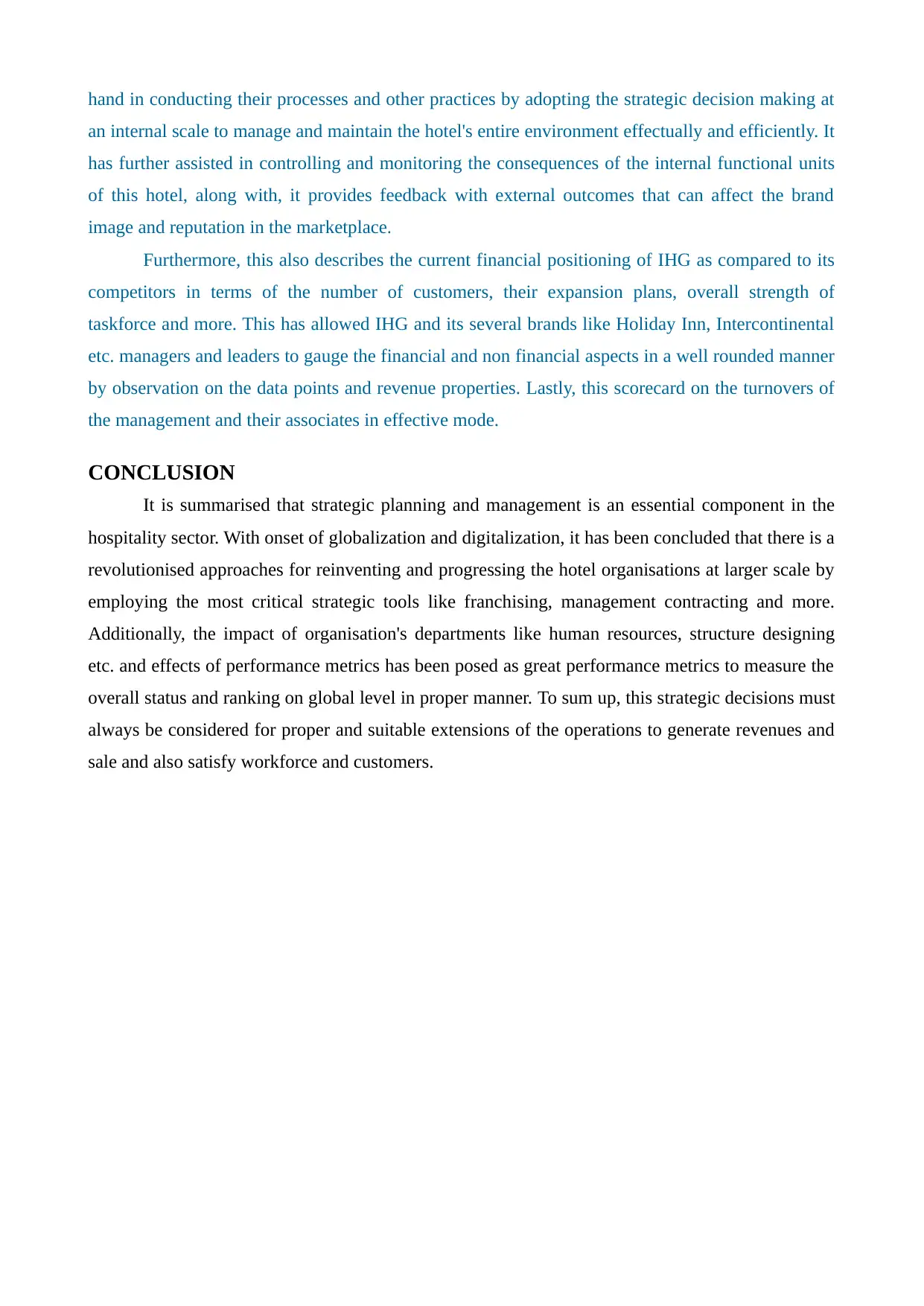
hand in conducting their processes and other practices by adopting the strategic decision making at
an internal scale to manage and maintain the hotel's entire environment effectually and efficiently. It
has further assisted in controlling and monitoring the consequences of the internal functional units
of this hotel, along with, it provides feedback with external outcomes that can affect the brand
image and reputation in the marketplace.
Furthermore, this also describes the current financial positioning of IHG as compared to its
competitors in terms of the number of customers, their expansion plans, overall strength of
taskforce and more. This has allowed IHG and its several brands like Holiday Inn, Intercontinental
etc. managers and leaders to gauge the financial and non financial aspects in a well rounded manner
by observation on the data points and revenue properties. Lastly, this scorecard on the turnovers of
the management and their associates in effective mode.
CONCLUSION
It is summarised that strategic planning and management is an essential component in the
hospitality sector. With onset of globalization and digitalization, it has been concluded that there is a
revolutionised approaches for reinventing and progressing the hotel organisations at larger scale by
employing the most critical strategic tools like franchising, management contracting and more.
Additionally, the impact of organisation's departments like human resources, structure designing
etc. and effects of performance metrics has been posed as great performance metrics to measure the
overall status and ranking on global level in proper manner. To sum up, this strategic decisions must
always be considered for proper and suitable extensions of the operations to generate revenues and
sale and also satisfy workforce and customers.
an internal scale to manage and maintain the hotel's entire environment effectually and efficiently. It
has further assisted in controlling and monitoring the consequences of the internal functional units
of this hotel, along with, it provides feedback with external outcomes that can affect the brand
image and reputation in the marketplace.
Furthermore, this also describes the current financial positioning of IHG as compared to its
competitors in terms of the number of customers, their expansion plans, overall strength of
taskforce and more. This has allowed IHG and its several brands like Holiday Inn, Intercontinental
etc. managers and leaders to gauge the financial and non financial aspects in a well rounded manner
by observation on the data points and revenue properties. Lastly, this scorecard on the turnovers of
the management and their associates in effective mode.
CONCLUSION
It is summarised that strategic planning and management is an essential component in the
hospitality sector. With onset of globalization and digitalization, it has been concluded that there is a
revolutionised approaches for reinventing and progressing the hotel organisations at larger scale by
employing the most critical strategic tools like franchising, management contracting and more.
Additionally, the impact of organisation's departments like human resources, structure designing
etc. and effects of performance metrics has been posed as great performance metrics to measure the
overall status and ranking on global level in proper manner. To sum up, this strategic decisions must
always be considered for proper and suitable extensions of the operations to generate revenues and
sale and also satisfy workforce and customers.
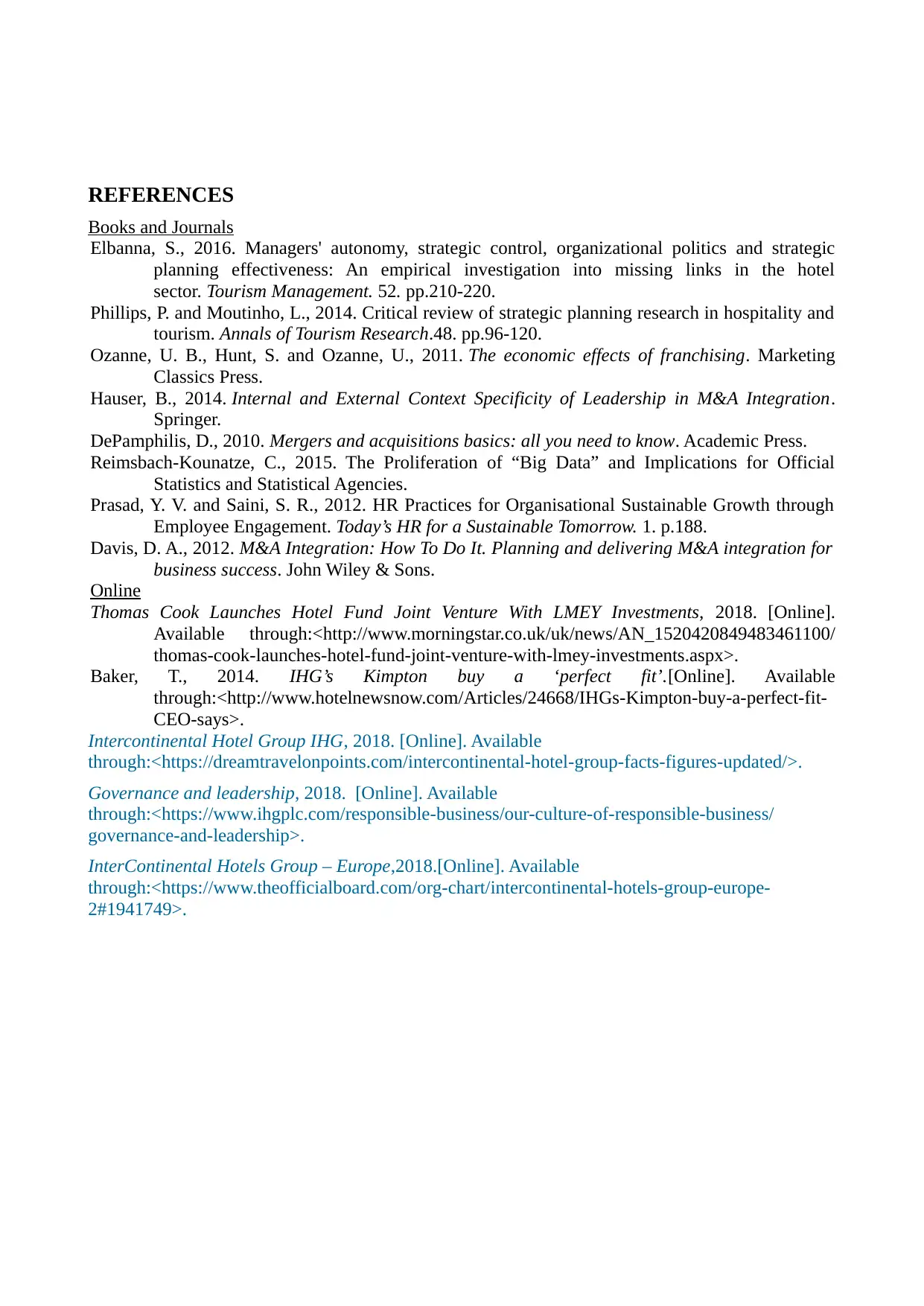
REFERENCES
Books and Journals
Elbanna, S., 2016. Managers' autonomy, strategic control, organizational politics and strategic
planning effectiveness: An empirical investigation into missing links in the hotel
sector. Tourism Management. 52. pp.210-220.
Phillips, P. and Moutinho, L., 2014. Critical review of strategic planning research in hospitality and
tourism. Annals of Tourism Research.48. pp.96-120.
Ozanne, U. B., Hunt, S. and Ozanne, U., 2011. The economic effects of franchising. Marketing
Classics Press.
Hauser, B., 2014. Internal and External Context Specificity of Leadership in M&A Integration.
Springer.
DePamphilis, D., 2010. Mergers and acquisitions basics: all you need to know. Academic Press.
Reimsbach-Kounatze, C., 2015. The Proliferation of “Big Data” and Implications for Official
Statistics and Statistical Agencies.
Prasad, Y. V. and Saini, S. R., 2012. HR Practices for Organisational Sustainable Growth through
Employee Engagement. Today’s HR for a Sustainable Tomorrow. 1. p.188.
Davis, D. A., 2012. M&A Integration: How To Do It. Planning and delivering M&A integration for
business success. John Wiley & Sons.
Online
Thomas Cook Launches Hotel Fund Joint Venture With LMEY Investments, 2018. [Online].
Available through:<http://www.morningstar.co.uk/uk/news/AN_1520420849483461100/
thomas-cook-launches-hotel-fund-joint-venture-with-lmey-investments.aspx>.
Baker, T., 2014. IHG’s Kimpton buy a ‘perfect fit’.[Online]. Available
through:<http://www.hotelnewsnow.com/Articles/24668/IHGs-Kimpton-buy-a-perfect-fit-
CEO-says>.
Intercontinental Hotel Group IHG, 2018. [Online]. Available
through:<https://dreamtravelonpoints.com/intercontinental-hotel-group-facts-figures-updated/>.
Governance and leadership, 2018. [Online]. Available
through:<https://www.ihgplc.com/responsible-business/our-culture-of-responsible-business/
governance-and-leadership>.
InterContinental Hotels Group – Europe,2018.[Online]. Available
through:<https://www.theofficialboard.com/org-chart/intercontinental-hotels-group-europe-
2#1941749>.
Books and Journals
Elbanna, S., 2016. Managers' autonomy, strategic control, organizational politics and strategic
planning effectiveness: An empirical investigation into missing links in the hotel
sector. Tourism Management. 52. pp.210-220.
Phillips, P. and Moutinho, L., 2014. Critical review of strategic planning research in hospitality and
tourism. Annals of Tourism Research.48. pp.96-120.
Ozanne, U. B., Hunt, S. and Ozanne, U., 2011. The economic effects of franchising. Marketing
Classics Press.
Hauser, B., 2014. Internal and External Context Specificity of Leadership in M&A Integration.
Springer.
DePamphilis, D., 2010. Mergers and acquisitions basics: all you need to know. Academic Press.
Reimsbach-Kounatze, C., 2015. The Proliferation of “Big Data” and Implications for Official
Statistics and Statistical Agencies.
Prasad, Y. V. and Saini, S. R., 2012. HR Practices for Organisational Sustainable Growth through
Employee Engagement. Today’s HR for a Sustainable Tomorrow. 1. p.188.
Davis, D. A., 2012. M&A Integration: How To Do It. Planning and delivering M&A integration for
business success. John Wiley & Sons.
Online
Thomas Cook Launches Hotel Fund Joint Venture With LMEY Investments, 2018. [Online].
Available through:<http://www.morningstar.co.uk/uk/news/AN_1520420849483461100/
thomas-cook-launches-hotel-fund-joint-venture-with-lmey-investments.aspx>.
Baker, T., 2014. IHG’s Kimpton buy a ‘perfect fit’.[Online]. Available
through:<http://www.hotelnewsnow.com/Articles/24668/IHGs-Kimpton-buy-a-perfect-fit-
CEO-says>.
Intercontinental Hotel Group IHG, 2018. [Online]. Available
through:<https://dreamtravelonpoints.com/intercontinental-hotel-group-facts-figures-updated/>.
Governance and leadership, 2018. [Online]. Available
through:<https://www.ihgplc.com/responsible-business/our-culture-of-responsible-business/
governance-and-leadership>.
InterContinental Hotels Group – Europe,2018.[Online]. Available
through:<https://www.theofficialboard.com/org-chart/intercontinental-hotels-group-europe-
2#1941749>.
⊘ This is a preview!⊘
Do you want full access?
Subscribe today to unlock all pages.

Trusted by 1+ million students worldwide
1 out of 12
Related Documents
Your All-in-One AI-Powered Toolkit for Academic Success.
+13062052269
info@desklib.com
Available 24*7 on WhatsApp / Email
![[object Object]](/_next/static/media/star-bottom.7253800d.svg)
Unlock your academic potential
Copyright © 2020–2026 A2Z Services. All Rights Reserved. Developed and managed by ZUCOL.





